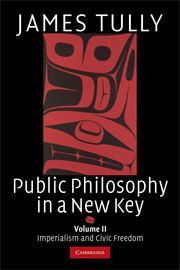Book contents
- Frontmatter
- Contents
- Acknowledgments
- Credits
- INTRODUCTION
- PART 1 GLOBAL GOVERNANCE AND PRACTICES OF FREEDOM
- PART 2 ON IMPERIALISM
- 5 On law, democracy and imperialism
- 6 Communication and imperialism
- 7 The imperial roles of modern constitutional democracy
- CONCLUSION: CIVIC FREEDOM CONTRA IMPERIALISM
- Bibliography
- Index to Volume II
7 - The imperial roles of modern constitutional democracy
Published online by Cambridge University Press: 05 September 2012
- Frontmatter
- Contents
- Acknowledgments
- Credits
- INTRODUCTION
- PART 1 GLOBAL GOVERNANCE AND PRACTICES OF FREEDOM
- PART 2 ON IMPERIALISM
- 5 On law, democracy and imperialism
- 6 Communication and imperialism
- 7 The imperial roles of modern constitutional democracy
- CONCLUSION: CIVIC FREEDOM CONTRA IMPERIALISM
- Bibliography
- Index to Volume II
Summary
INTRODUCTION
The title of this chapter derives from an article in the Economic History Review in 1953 by John Gallagher and Ronald Robinson entitled ‘The Imperialism of Free Trade’. The authors showed that the foreign policy of free trade by the imperial powers in the nineteenth and twentieth centuries was not anti-imperial but, rather, an alternative form of imperialism to colonial imperialism that gradually won out in the late twentieth century. The ‘great powers’, with Great Britain in the lead, realised that they could orchestrate the formation of legal and political regimes in non-European countries so they would function to ‘open’ their resources, labour and markets to ‘free trade’ dominated by economic competition among European powers, without the need for the expensive and increasingly unpopular old imperial system of formal colonies and monopoly trading companies. In a series of publications in the following decades, Robinson, the German imperial historians Wolfgang J. Mommsen and Jürgen Osterhammel, and their many followers went on to document the long and complex history of free trade imperialism since the eighteenth century and to argue that decolonisation and the Cold War comprised its triumph over colonial imperialism. Decolonisation and the Cold War, they argued, involved the dismantling of the remaining formal colonies, mandates and trusteeships; the transfer of limited powers of self-rule to the westernised elites of nominally sovereign, yet dependent Indigenous governments in a global network of free trade imperialism.
- Type
- Chapter
- Information
- Public Philosophy in a New Key , pp. 195 - 222Publisher: Cambridge University PressPrint publication year: 2008
- 1
- Cited by

